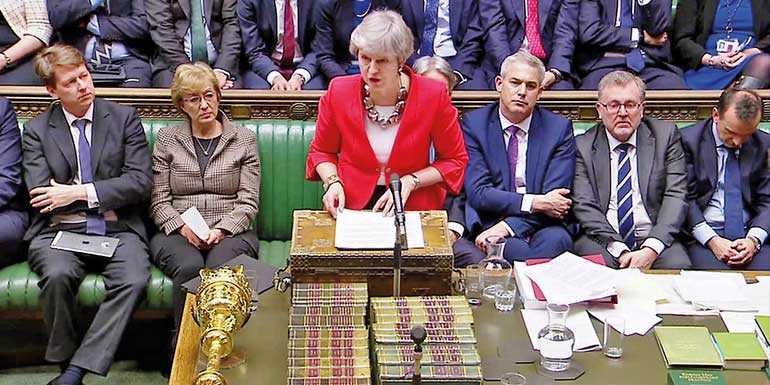Saturday Feb 21, 2026
Saturday Feb 21, 2026
Thursday, 14 March 2019 01:54 - - {{hitsCtrl.values.hits}}

LONDON (Reuters): MPs crushed Prime Minister Theresa May’s European Union divorce deal on Tuesday, thrusting Britain deeper into crisis and forcing parliament to decide within days whether to back a no-deal Brexit or seek a last-minute delay.
MPs voted against May’s amended Brexit deal by 391 to 242 as her last-minute talks with EU chiefs on Monday to assuage her critics’ concerns ultimately proved fruitless.
The vote puts the world’s fifth largest economy in uncharted territory with no obvious way forward; exiting the EU without a deal, delaying the 29 March divorce date, a snap election or even another referendum are all now possible.
May might even try a third time to get parliamentary support in the hope that hardline eurosceptic MPs in her Conservative Party, the most vocal critics of her withdrawal treaty, might change their minds if it becomes more likely that Britain might stay in the EU after all.
While she lost, the margin of defeat was smaller than the record 230-vote loss her deal suffered in January.
MPs will now vote at 1900 GMT on Wednesday on whether Britain should quit the world’s biggest trading bloc without a deal, a scenario that business leaders warn would bring chaos to markets and supply chains, and other critics say could cause shortages of food and medicines.
May said the government would not instruct her own party’s MPs how to vote, as would normally be the case.
An opposition Labour Party spokesman said this meant she had “given up any pretence of leading the country”. May’s political spokesman said she had not discussed resigning.
The prime minister, hoarse after Monday’s late-night talks, told MPs: “Let me be clear. Voting against leaving without a deal and for an extension does not solve the problems we face.”
She said parliament was now at an impasse: “Does it wish to revoke Article 50 (announcing intention to leave the EU)? Does it want to hold a second referendum? Or does it want to leave with a deal, but not this deal?”
Graham Brady, an influential Conservative lawmaker, said the two most likely scenarios were leaving the EU without a deal “or some kind of endless delay”.
Andrea Leadsom, who manages government business in parliament, insisted however that “it is still our intention, if at all possible, to leave the EU on 29 March with a good deal”.
The European Union said the risk of a damaging no-deal Brexit has “increased significantly” but there would be no more negotiations with London on the divorce terms.
Sterling, which had earlier in the day fallen by 2% to $1.3005, was trading at around $1.3086 shortly after the vote.
“One door has closed but other possibilities have opened up and markets are hopeful that Wednesday’s vote on a no-deal Brexit will suffer a big defeat,” said Timothy Graf, head of macro strategy at State Street Global Advisors in London.
Opposition to May’s deal among members of the Conservative Party derives from a belief that it does not offer the clean break from the European Union that many voted for.
Supporters of Brexit argue that, while a “no-deal” divorce might bring some short-term instability, in the longer term it would allow the United Kingdom to thrive and forge beneficial trade deals across the world.
However, parliament is expected firmly to reject a “no-deal” Brexit as well, so MPs would then vote again on Thursday – on whether government should request a delay to the leaving date to allow further talks.
Both May and the EU have already ruled out any other changes to the deal, struck after two-and-a-half years of tortuous negotiations.
“There will be no third chance,” European Commission President Jean-Claude Juncker said on Monday. “There will be no further interpretations of the interpretations, no further assurances of the reassurances if the ‘meaningful vote’ tomorrow fails.”

EU says no more Brexit talks with UK, risk of no-deal increased